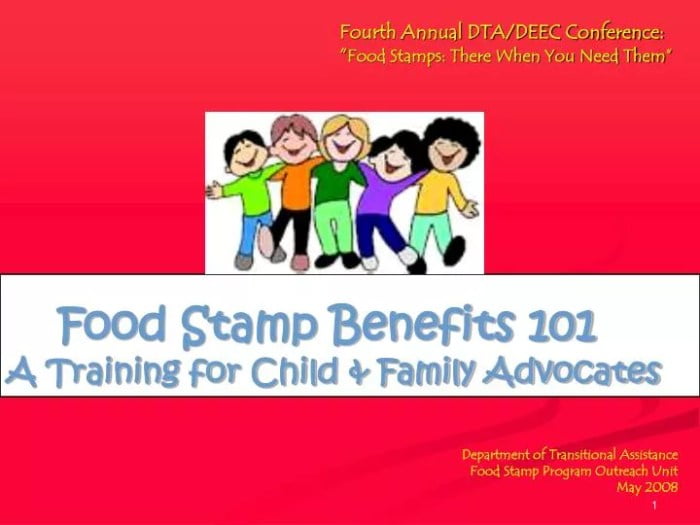Foster parenting is a rewarding yet challenging endeavor that often comes with financial burdens. One way to alleviate these burdens is through the Supplemental Nutrition Assistance Program (SNAP), commonly known as food stamps. In this comprehensive guide, we’ll delve into the eligibility criteria, benefits, application process, and ongoing requirements for foster parents seeking food stamps.
Food stamps provide a lifeline for many low-income families, including foster parents. By understanding the program’s intricacies, foster parents can access essential nutritional support for themselves and the children in their care.
Eligibility for Food Stamps for Foster Parents

Foster parents may qualify for food stamps, a federal nutrition assistance program, if they meet certain income and asset limits. The program provides monthly benefits to purchase food and improve the nutritional well-being of eligible individuals and families.To be eligible for food stamps, foster parents must:
- Be responsible for the care and custody of a foster child who is under 18 years of age or a dependent student under 22 years of age.
- Meet the income and asset limits set by the program.
- Provide proof of identity, residence, and income.
Income Limits
The income limits for food stamps are based on the household size and gross monthly income. Foster parents must meet the following income limits to qualify:
- Household of 1: $1,689
- Household of 2: $2,296
- Household of 3: $2,903
- Household of 4: $3,510
For each additional person in the household, add $607 to the income limit.
Asset Limits
Foster parents must also meet the asset limits set by the program. The asset limits vary depending on the state of residence and household size. Generally, the asset limits are:
- For households with one or two members: $2,500
- For households with three or more members: $4,000
Documentation Required
To prove eligibility for food stamps, foster parents must provide the following documentation:
- Proof of identity (e.g., driver’s license, state ID card)
- Proof of residence (e.g., utility bill, lease agreement)
- Proof of income (e.g., pay stubs, bank statements)
- Proof of foster child placement (e.g., court order, letter from social services)
Benefits of Food Stamps for Foster Parents
Food stamps provide numerous benefits to foster parents, enabling them to adequately care for their foster children’s nutritional needs while alleviating financial burdens.
One significant benefit of food stamps is the ability to purchase nutritious food items that meet the specific dietary requirements of foster children. These may include specialized formula for infants, fresh fruits and vegetables, lean protein sources, and whole grains.
By ensuring access to a balanced diet, food stamps promote the healthy growth and development of foster children.
Financial Assistance
Food stamps also provide much-needed financial assistance to foster parents. The cost of raising a child is substantial, and food expenses can be a significant portion of a family’s budget. Food stamps help offset these expenses, freeing up funds that can be used for other essential needs such as housing, clothing, and healthcare.
For example, a foster family with two foster children may receive around $600 per month in food stamp benefits. This amount can significantly reduce the family’s grocery bill, allowing them to allocate more resources to other areas that support the well-being of their foster children.
Applying for Food Stamps as a Foster Parent

Applying for food stamps as a foster parent is a crucial step in ensuring that you and the children in your care have access to nutritious meals. The process involves several steps:
Completing the Application Form
Obtain the food stamp application form from your local Department of Social Services office or download it from their website. Fill out the form accurately, providing details such as your income, household size, and expenses.
Gathering Supporting Documents
Gather supporting documents to verify your eligibility, such as:
- Proof of identity (e.g., driver’s license, state ID card)
- Proof of income (e.g., pay stubs, bank statements)
- Proof of expenses (e.g., rent or mortgage payments, utility bills)
- Proof of foster care status (e.g., court order, letter from foster care agency)
Submitting the Application
Submit the completed application form and supporting documents to your local Department of Social Services office. You can submit it in person, by mail, or online if available.
Verifying Eligibility
The Department of Social Services will review your application and verify your eligibility based on the information provided and supporting documents. They may request additional information or conduct an interview.
Maintaining Eligibility for Food Stamps
Foster parents must continuously meet specific requirements to maintain their eligibility for food stamps. These requirements include:
-
-*Income and Resource Limits
Foster parents must have an income and resources below the program’s limits. Income and resource limits vary depending on household size and composition.
-*Work Requirements
Able-bodied foster parents between the ages of 18 and 59 must meet work requirements. These requirements include working or participating in an approved work program for at least 20 hours per week.
-*Citizenship or Immigration Status
Foster parents must be U.S. citizens, permanent residents, or legal immigrants to be eligible for food stamps.
Reporting Obligations
Foster parents receiving food stamps have certain reporting obligations. They must report any changes in their income, resources, or household composition within 10 days of the change.
Failure to report changes can result in disqualification from the program.
Avoiding Disqualification
Foster parents can avoid disqualification from the food stamp program by:
- Meeting all eligibility requirements
- Complying with work requirements
- Reporting changes promptly
- Cooperating with the agency administering the program
- Using food stamps for authorized purchases only
Closure

Navigating the food stamp program as a foster parent can be daunting, but it’s essential to ensure the nutritional well-being of your foster children. By carefully following the eligibility criteria, completing the application thoroughly, and fulfilling the ongoing requirements, foster parents can harness this valuable resource to ease the financial strain and provide a healthier future for the children they care for.
FAQs
Do foster parents automatically qualify for food stamps?
No, foster parents must meet specific income and asset limits to qualify for food stamps.
What documentation is required to prove eligibility for food stamps as a foster parent?
Foster parents need to provide proof of income, assets, and the number of people in their household, including foster children.
How can food stamps help foster parents meet the nutritional needs of their foster children?
Food stamps provide a monthly benefit that can be used to purchase a wide range of nutritious foods, ensuring that foster children have access to a balanced and healthy diet.